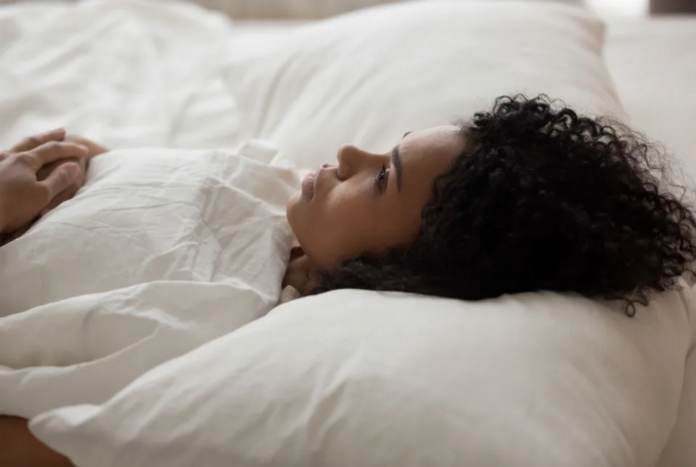Trouble sleeping? Your skin might have something to do with it, study finds
A night of poor sleep can easily show up on your skin. Dark circles, breakouts, inflammation, and a dull, sallow complexion can all betray a lack of shut-eye. Beauty sleep, we know, is very much real.
But the sleep-skin connection is not a one-way street. In fact, new research demonstrates it’s the other way around, with skin issues themselves actually leading to poor sleep. Here, the telltale signs your complexion may impact your sleep quality.
How your skin can affect your sleep
The study, which was presented at the European Academy of Dermatology and Venereology (EADV) Congress 2023, measured data from over 50,000 adults across 20 countries and found that almost half (42%) of participants with skin disease experience sleep disturbances. It seems itching, burning, and tingling sensations impacted sleep the most.
In addition to sleep disturbances, researchers discovered the following in folks who struggle with skin disease:
- 81% reported frequently feeling fatigue as soon as they woke up
- 83% of patients experienced periods of drowsiness during the day
- 58% had tingling sensations in the eyes
- 72% experienced repeated yawning
And “skin disease” casts a rather wide net—any inflammatory condition is technically a skin disease, including eczema, psoriasis, and even acne.
According to board-certified holistic dermatologist Noreen Galaria, M.D., FAAD, it’s the itchy conditions (think eczema and psoriasis) that may impact sleep the most. “The itch is more prominent at night as your body cools down for sleep,” she tells mindbodygreen. “This means as people are trying to fall asleep, heat is escaping through our skin to cool us down and make us ready for bed.” And heat is a common trigger for inflammatory skin conditions, which can increase itchiness.
“This, in turn, increases scratching right when patients are trying to wind down and relax, which creates a vicious cycle of trouble falling asleep,” she adds. After all, feeling anxious about falling asleep often keeps you up even later.
“Inflammatory conditions, like eczema and psoriasis, are the ones that affect sleep the most because of the way they affect your cortisol levels,” Galaria shares. And high cortisol levels can cause you to toss and turn all night1
and feel tired again the next day. “It is truly a cycle,” she notes.
What to do about it
First things first: If you have an inflammatory skin condition, consulting a dermatologist will be your best bet. Especially if your symptoms keep you from achieving a good night’s sleep, it’s important to work with a professional for targeted treatments. That being said, researchers urge health care providers to ask about any sleep disturbances when examining patients with skin conditions, given the strong connection.
The deep and restorative sleep you’ve always dreamt about*
For itchy skin conditions, identifying your triggers (which differ for everyone) is key. From there, keep your skin barrier strong and healthy with moisturizing, lipid-rich ingredients—think ceramides, squalane, fatty acids, etc. Galaria also recommends investing in a humidifier, since a dry environment can damage the moisture barrier and lead to itchiness and irritation. (Find our favorite options here.)
Finally, “It’s important for these people to have a strong bedtime routine to help regulate their circadian rhythm,” Galaria notes. Start your wind-down regimen at least 30 minutes before hitting the hay: Dim the lights, read while wearing blue-light-blocking glasses2
, take a warm bath, pop a natural sleep aid… You have plenty of options. (More here!)
The takeaway
A lack of sleep can impact your skin—and apparently, vice versa. Given the intimate relationship between stress and skin health, it makes total sense. There’s still much to learn about the exact mechanisms at play here, but consider it a sign to start prioritizing beauty sleep as much as you can.
The deep and restorative sleep you’ve always dreamt about*
Want to turn your passion for wellbeing into a fulfilling career? Become a Certified Health Coach! Learn more here.
Jamie Schneider is the Beauty Editor at mindbodygreen. She has a B.A. in Organizational Studies and English from the University of Michigan, and her work has appeared in Coveteur, The Chill Times, and more. In her role at mbg, she reports on everything from the top beauty industry trends, to the gut-skin connection and the microbiome, to the latest expert makeup hacks. She currently lives in Brooklyn, New York.
2 Sources
About usContactWrite for usJobsAdvertiseBecome an AffiliateCollective
© 2009 – 2023 mindbodygreen LLC. All rights reserved.
* These statements have not been evaluated by the Food and Drug Administration. This product is not intended to diagnose, treat, cure or prevent any disease.
Terms of SaleTerms of UseDisclaimerPrivacyData CollectionAccessibilityEditorial Process
Navigated to Trouble Sleeping? Your Skin Might Have Something To Do With It, Study Finds

